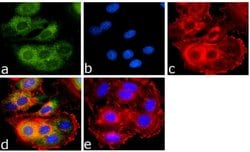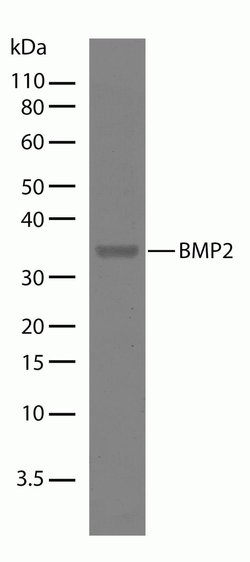Learn More
Invitrogen™ BMP-2 Recombinant Superclonal™ Antibody (18HCLC)
Rabbit Recombinant Superclonal Antibody
Supplier: Invitrogen™ 710022
Description
This antibody is predicted to react with mouse based on sequence homology. Recombinant rabbit Superclonal™ antibodies are unique offerings from Thermo Fisher Scientific. They are comprised of a selection of multiple different recombinant monoclonal antibodies, providing the best of both worlds - the sensitivity of polyclonal antibodies with the specificity of monoclonal antibodies - all delivered with the consistency only found in a recombinant antibody. While functionally the same as a polyclonal antibody - recognizing multiple epitope sites on the target and producing higher detection sensitivity for low abundance targets - a recombinant rabbit Superclonal™ antibody has a known mixture of light and heavy chains. The exact population can be produced in every lot, circumventing the biological variability typically associated with polyclonal antibody production. Note: Formerly called Recombinant polyclonal antibody, this product is now rebranded as Recombinant Superclonal™ antibody. The physical product and the performance remain unchanged.
Bone Morphogenic Proteins (BMP) are members of the TGF-beta superfamily that affect bone and cartilage formation (Hogan 1996, Reddi 1998 and Francis-West et al. 1999). Mature BMPs are 30-38 kDa proteins that assume a TGF-beta -like cysteine knot configuration. Lovostatin increases bone formation by turning on the bmp-2 gene (Mundy et al. 1999). BMPs stimulate the production of specific bone matrix proteins and alter stromal cell and osteoclast proliferation (Macias et al. 1999, Lecanda et al. 1997). BMPs may also be an important factor for development of the viscera, with roles in cell proliferation, apoptosis, differentiation, and morphogenesis (Hogan 1996, Dale and Wardle 1999). BMPs appear to be responsible for normal dorsal/ventral patterning. Like TGF-beta, BMPs bind to a type II receptor, which then recruits the transducing type I receptor unit, activating the Smad protein signaling pathway (Massague 1994, Derynck 1997, Attisano 1993).
Specifications
| BMP-2 | |
| Recombinant Superclonal | |
| 0.5 mg/mL | |
| PBS with 0.09% sodium azide | |
| P12643 | |
| BMP2 | |
| Protein corresponding to amino acids 283-396 of human BMP2. | |
| 100 μg | |
| Primary | |
| Human | |
| Antibody | |
| IgG |
| Western Blot, Immunocytochemistry | |
| 18HCLC | |
| Unconjugated | |
| BMP2 | |
| 2610024H22Rik; AI467020; AL117858; AW546137; BB189135; BDA2; BMP; BMP2; BMP-2; BMP2A; BMP-2A; BMPRII; BMPR-II; Bone morphogenetic; Bone morphogenetic protein; Bone morphogenetic protein 2; bone morphogenetic protein 2 precursor (BMP-2) (BMP-2A); bone morphogenetic protein 2A; H-BMP-2; morphogen | |
| Rabbit | |
| Protein A | |
| RUO | |
| 650 | |
| Store at 4°C short term. For long term storage, store at -20°C, avoiding freeze/thaw cycles. | |
| Liquid |
Safety and Handling
Your input is important to us. Please complete this form to provide feedback related to the content on this product.

